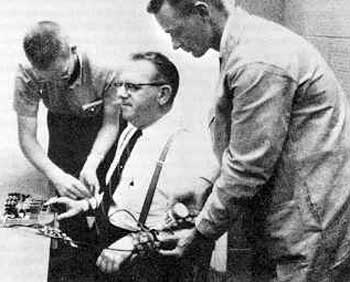A carrot is to create a Behavioral Insights project, similar to one that exists in the United Kingdom, tasked with using the awesome power of social science to create the behavior they want - it's like framing on steroids.
Obviously everyone uses behavioral data - applied marketing is terrifically successfully and is the one aspect of psychology we know really works. But corporations at least use the money from people who already like their product to create more people who like their product. The government is instead going to use money from everyone to get all the people who don't like a particular policy to embrace it anyway. So all those school kids who didn't like the First Lady's weirdly ill-conceived school lunch plan can now know their parents' taxes are going to be used to convince children that school lunches should be a social engineering project rather than a meal.(1)

Here's hoping Yale psychologists get to be on this committee. Stanley Milgram showed how well behavioral experiments worked in 1961, 84% of participants afterward said they were glad to have participated in the behavior control project that made him famous. Hint: It is way better to be the teacher than the learner. Just sayin'. Link: Listverse
Maya Shankar, a White House senior adviser on social and behavioral sciences, sent the outline of who they needed to (naturally) an academic. It was dutifully circulated. The administration likes to use the term 'nudge' for this sort of thing, an idea they got from a former adviser, who is obviously pleased that a social hypothesis is now the basis for a grand, expensive, real-time social experiment Even the use of the term 'nudge' was careful behavioral framing. It sounds like people will be gently guided into seeing the wisdom of policies - except laws don't actually work that way.
Credit: Becket Adams
Obviously the scariness of this, or the belief that it will make government more efficient, tells people how you vote.
The most clever part is right up front in their explanation, 'a growing body of evidence' could have been right out of an academic press release. It sounds like science. And 'help people achieve their goals' - see, the policies we turn into law are for you, and now you can "help build federal capacity to experiment with these approaches." (2)
If you don't help us 'nudge' people into policies we want them to like, the terrorists win.
No more surveying psychology undergraduates to write papers, now you can use the whole country as a test case, though they recognize that such awesome power is not for everyone, so they want to make sure candidates only come from groups with the right mindset: government or academic employees, maybe the right non-profit also. Because they think the NSA is a lot more trustworthy than anyone in the corporate world.
And when did the government suddenly become so accurate that they should be confident 'nudging' the public to agree? Politicians get data they happen to like, about positions they happen to advocate, and declare the science settled.
As Michael Thomas, an economist at Utah State University, told Maxim Lott, it's not always right jumping on a bandwagon. "Trans-fats were considered better than saturated and unsaturated fats in the past. Now we know this is an error."
NOTES:
(1) What one school thought about one of the many 'behavioral insights' projects foisted off on the public last year:
(2) Doesn't the government already have CNN doing similar behavior insights projects for them? I can't figure out any other reason for New York City School Goes Vegetarian - CNN Gushes How Enthusiastic Students Are Over 'Healthy Choices'.




Comments